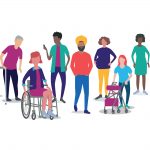Knowledge mobilisation and implementation science
Using research and knowledge in innovative ways, to improve health and care across our region.

What do we mean by knowledge mobilisation?
Knowledge mobilisation (KM) is about sharing knowledge between different communities to support change and create impact.
To create impact, the following three elements are needed: diverse knowledge, different communities and active use of their combined knowledge to change something.
Blending and acting on knowledge from different communities leads to new ideas, innovations, and new ways of working. Sharing knowledge alone is dissemination. Knowledge mobilisation generates impact.
What is implementation science?
Implementation science looks at how to design and then evaluate activities that will support the adoption of health interventions, in society. This includes looking at what might be influencing behaviour or preventing change, as well as how well-engaged audiences and communities might be.
Our SKIM work
Our SKIM work draws on theory-based approaches from implementation science and knowledge mobilisation. We work to co-develop new, applied versions of these tools in partnership with academics, practitioners, and service users so that they can be used in society.
Many SKIM approaches are not currently ‘fit for purpose’ for health and social care practitioners who are innovating care and service provision in their fields. Our work will aim to improve this, by creating structures for finding, sharing and enhancing our collective knowledge. This will include looking at how we can use service-users’ contributions to make improvements to health and social care provision.
Our early projects include:
- Developing a best-practice model of how to mobilise and implement evidence in local health practice and policy that accounts for contextual complexity, and offers tools for users
- Increasing capacity in SKIM amongst practitioners and researchers (regional and national)
- Developing and supporting the implementation of an evaluation framework across the ARC to capture impact of implementation tools and knowledge mobilisation activities
- The dissemination of learning and SKIM tools, through publications, social media and events for partners
- Creating a culture of embedded research through evidencing the impact of embedded posts
- Assessing the impact of COVID-19 on health inequalities with Public Health England North East, alongside the development of a COVID-19 knowledge exchange network (C-WorKS)
- Providing conceptual and methodological support across our ARC
We are focussed on working collaboratively with partners both within and outside of our ARC, to understand how knowledge is currently mobilised, generating new knowledge about how this can be improved, and applying learning from the work of SKIM to evaluate and impact activity.
Working with other ARCs
We are a member of an emerging Cross-ARC Improvement/Implementation Science Theme Lead Network. As part of this network, we share relevant projects, particularly related to COVID-19, and look for future opportunities to develop new projects together.
Resources

Meet the team











